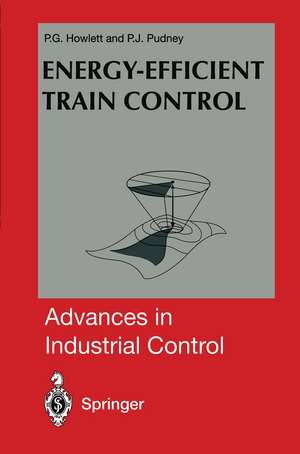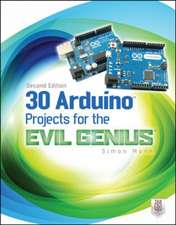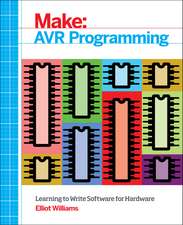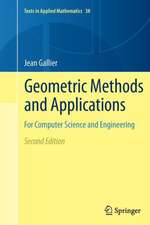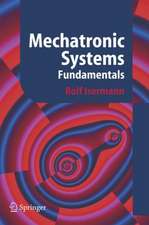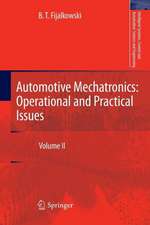Energy-Efficient Train Control: Advances in Industrial Control
Autor Philip G. Howlett, Peter J. Pudneyen Limba Engleză Paperback – 7 dec 2011
Din seria Advances in Industrial Control
- 15%
 Preț: 643.34 lei
Preț: 643.34 lei - 23%
 Preț: 582.63 lei
Preț: 582.63 lei - 18%
 Preț: 783.98 lei
Preț: 783.98 lei - 18%
 Preț: 947.35 lei
Preț: 947.35 lei - 20%
 Preț: 568.24 lei
Preț: 568.24 lei - 15%
 Preț: 643.16 lei
Preț: 643.16 lei - 18%
 Preț: 899.21 lei
Preț: 899.21 lei - 18%
 Preț: 891.33 lei
Preț: 891.33 lei - 18%
 Preț: 740.57 lei
Preț: 740.57 lei - 18%
 Preț: 961.23 lei
Preț: 961.23 lei - 18%
 Preț: 955.08 lei
Preț: 955.08 lei - 15%
 Preț: 645.28 lei
Preț: 645.28 lei - 15%
 Preț: 638.43 lei
Preț: 638.43 lei - 18%
 Preț: 901.11 lei
Preț: 901.11 lei - 18%
 Preț: 1410.94 lei
Preț: 1410.94 lei - 18%
 Preț: 728.91 lei
Preț: 728.91 lei - 20%
 Preț: 1003.78 lei
Preț: 1003.78 lei - 18%
 Preț: 947.35 lei
Preț: 947.35 lei - 15%
 Preț: 643.34 lei
Preț: 643.34 lei - 15%
 Preț: 654.30 lei
Preț: 654.30 lei - 18%
 Preț: 950.52 lei
Preț: 950.52 lei - 15%
 Preț: 644.30 lei
Preț: 644.30 lei - 18%
 Preț: 1393.09 lei
Preț: 1393.09 lei - 18%
 Preț: 950.21 lei
Preț: 950.21 lei - 18%
 Preț: 949.90 lei
Preț: 949.90 lei - 18%
 Preț: 949.42 lei
Preț: 949.42 lei - 18%
 Preț: 950.52 lei
Preț: 950.52 lei - 18%
 Preț: 1113.71 lei
Preț: 1113.71 lei - 15%
 Preț: 650.04 lei
Preț: 650.04 lei - 15%
 Preț: 644.95 lei
Preț: 644.95 lei - 18%
 Preț: 950.33 lei
Preț: 950.33 lei - 18%
 Preț: 948.61 lei
Preț: 948.61 lei - 18%
 Preț: 1112.60 lei
Preț: 1112.60 lei - 15%
 Preț: 644.63 lei
Preț: 644.63 lei - 18%
 Preț: 953.20 lei
Preț: 953.20 lei - 18%
 Preț: 945.62 lei
Preț: 945.62 lei - 15%
 Preț: 640.88 lei
Preț: 640.88 lei - 15%
 Preț: 640.88 lei
Preț: 640.88 lei - 20%
 Preț: 650.92 lei
Preț: 650.92 lei - 18%
 Preț: 1112.60 lei
Preț: 1112.60 lei - 20%
 Preț: 998.36 lei
Preț: 998.36 lei - 15%
 Preț: 643.34 lei
Preț: 643.34 lei - 18%
 Preț: 948.92 lei
Preț: 948.92 lei - 18%
 Preț: 1381.43 lei
Preț: 1381.43 lei - 15%
 Preț: 651.51 lei
Preț: 651.51 lei - 15%
 Preț: 647.08 lei
Preț: 647.08 lei - 20%
 Preț: 563.66 lei
Preț: 563.66 lei - 18%
 Preț: 992.64 lei
Preț: 992.64 lei - 18%
 Preț: 1225.79 lei
Preț: 1225.79 lei
Preț: 642.18 lei
Preț vechi: 755.51 lei
-15% Nou
Puncte Express: 963
Preț estimativ în valută:
122.90€ • 133.45$ • 103.23£
122.90€ • 133.45$ • 103.23£
Carte tipărită la comandă
Livrare economică 22 aprilie-06 mai
Preluare comenzi: 021 569.72.76
Specificații
ISBN-13: 9781447130864
ISBN-10: 1447130863
Pagini: 332
Ilustrații: XXI, 306 p.
Dimensiuni: 155 x 235 x 17 mm
Greutate: 0.47 kg
Ediția:Softcover reprint of the original 1st ed. 1995
Editura: SPRINGER LONDON
Colecția Springer
Seria Advances in Industrial Control
Locul publicării:London, United Kingdom
ISBN-10: 1447130863
Pagini: 332
Ilustrații: XXI, 306 p.
Dimensiuni: 155 x 235 x 17 mm
Greutate: 0.47 kg
Ediția:Softcover reprint of the original 1st ed. 1995
Editura: SPRINGER LONDON
Colecția Springer
Seria Advances in Industrial Control
Locul publicării:London, United Kingdom
Public țintă
Professional/practitionerCuprins
Section A: Introduction.- 1 The Train Control Problem.- 2 Modelling the Train Control Problem.- 3 Practical Driving Strategies.- 4 Constrained Optimisation—An Intuitive View.- Section B: Analysis of the Mechanical Energy Model.- 5 Existence of an Optimal Strategy.- 6 Necessary Conditions for an Optimal Strategy.- 7 Determination of Optimal Driving Strategies.- Section C: Analysis of the Fuel Consumption Model.- 8 Critical Speeds and Strategies of Optimal Type.- 9 Minimisation of Fuel Consumption.- 10 A More General Model.- 11 Speed Limits.- 12 Non-Constant Gradient.- 13 Continuously Varying Gradient.- 14 Practical Strategy Optimisation.- References.
